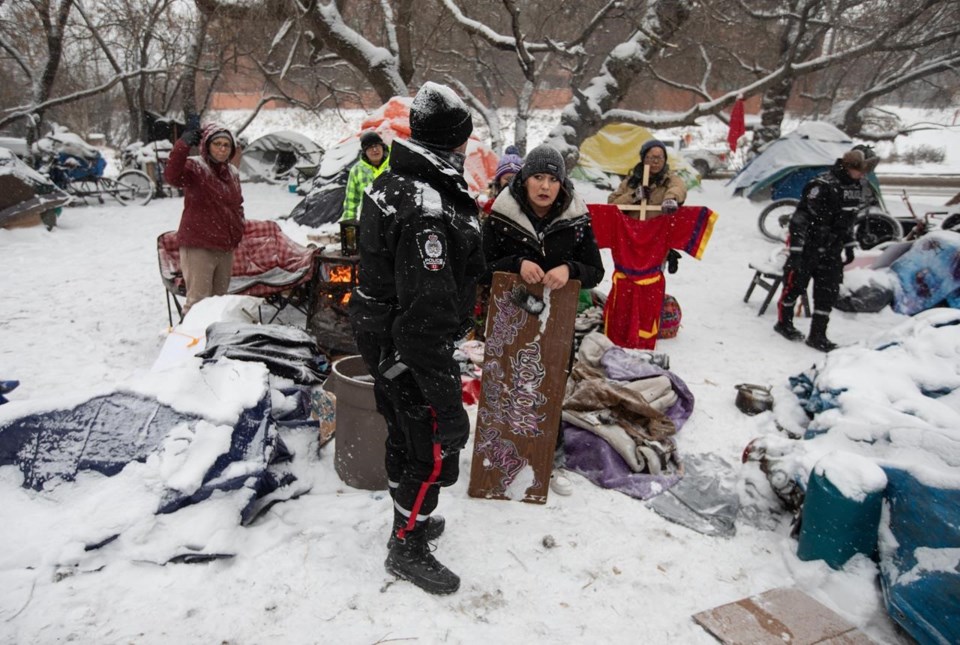EDMONTON — Council of Alberta's capital city passed a motion Tuesday declaring a homelessness and housing emergency, but the vote wasn't unanimous.
The resolution was brought by Mayor Amarjeet Sohi, who said action had to be taken because of a jump in homelessness in the city and because people are dying.
"If we don't treat this as a long-term emergency, more and more Edmontonians will fall through the cracks and become homeless," Sohi said in his final pitch to council.
"They're one cheque away from losing their housing. At one time, I was one of those Edmontonians. I could have ended up on the street but community was there to support me, lift me up. But as a system we are failing people."
The emergency was passed by a vote of 9-4.
Some council members objected to the situation being labelled an emergency, with deputy mayor Aaron Paquette saying it sends the wrong message.
"My ancestors have been in this emergency since the road allowance, since colonization. I worry if we declare this, we let other governments off the hook. It's not something we actually have power over," said Paquette, who is Indigenous.
"We don't have the budget and that's the frustrating position we are in. We are making a promise to all of you that we as a municipality are taking on a responsibility that we have no hope of ever fulfilling. We simply can't do it."
Coun. Erin Rutherford said it's important to send a message that Edmonton needs help from other levels of government.
"We needed to have this conversation. We needed Edmontonians to know that we care. And we needed Edmontonians and the rest of the country ... to understand that we need help," she said.
"There's criticism out there that this is symbolic. It's not symbolic, because there are actions that are matched with this."
Municipal Affairs Minister Ric McIver called the city's move a "performative" one that implies a lack of response from the provincial government.
"It is important to clarify to Albertans that this motion does not have any legal implications, authority or binding force," McIver said in a statement.
"The provincial government will continue to work with Grand Chief Cody Thomas, Chief Dale McFee of the Edmonton Police Service, as well as City of Edmonton employees to protect vulnerable Albertans."
Sohi and council are to invite Alberta's social services minister, the federal housing minister and Thomas, the grand chief of the Confederacy of Treaty 6 First Nations, to discuss possible solutions at an emergency meeting.
Council also agreed to have city and community leaders team up to create a future vision, raise money to help support social service efforts, and reduce red tape.
Federal Indigenous Services Minister Patty Hajdu said she met with Prairie mayors before Christmas and discussed how addressing homelessness is everyone's responsibility.
"We are each others' people. And the more that we work together and pull together for solutions … the better it's going to be," Hajdu said at an event in Eden Valley, southwest of Calgary.
"I think gone are the days that we fight about whose responsibility is it and we need to pull together."
Last week, police in Edmonton dismantled the last of eight homeless encampments deemed by the city to be high risk.
The Coalition for Justice and Human Rights filed a lawsuit over the city’s encampment eviction policy. It was seeking an injunction to put restrictions on the city and police response to camps in certain situations, such as when temperatures get too low.
In a statement, the coalition said the court decided to dismiss the legal action because the organization lacks public interest standing to bring a lawsuit on behalf of people living in encampments.
"We are deeply disappointed with the outcome. It seems that the courts may not fully grasp the extent of our efforts in assisting the homeless and the most vulnerable members of our community," said coalition vice-president Mark Cherrington.
"Our engagements within the community are focused on aiding individuals at risk of homelessness. To suggest otherwise is inaccurate."
This report by The Canadian Press was first published Jan. 16, 2024.
— By Bill Graveland in Calgary
The Canadian Press



